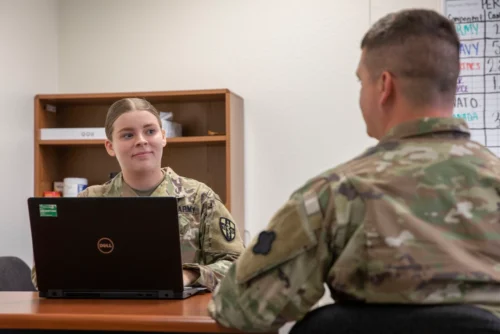VA Survivors’ & Dependents’ Educational Assistance

The Department of Veterans Affairs offers education benefits for qualifying dependents and surviving spouses of military members who have died, are missing, or are prisoners of war. Known as the VA Survivors’ and Dependents’ Educational Assistance (DEA) program, it is also referred to as Chapter 35 benefits and is offered to those who meet VA criteria, which we’ll explore below.
What Benefits Come with VA DEA?
The Department of Veterans Affairs offers qualifying applicants a monthly payment that can help offset the cost of:
- Undergraduate college degree programs
- Graduate-level degree programs
- Career-training certificates
- Educational and career counseling
- Apprenticeships
- On-the-job training
These benefits are available to most who start using them today for up to 36 months. Those who started using VA DEA before August 1, 2018, had 45 months of benefits.
Benefits are paid according to the nature of your attendance; full-time, half-time, etc. The nature of your training or coursework may also determine your pay rates. For example, the full-time monthly rate in October 2021 for “institutional training” was listed at $1,298.00. Three-quarter -time attendance was paid at $1,026.00 in 2021, and half-time attendance was paid at $753.00.
For “Correspondence” training, there is a payment that is calculated at “55 percent of the established charge for the number of lessons completed” paid every quarter.
For apprenticeships and on-the-job training, VA DEA benefits in 2021 were paid out at $825.00 per month for the first six months of training. The second six months were paid monthly at a rate of $620.00, with lower rates paid for the remainder of the training period.
There are certain benefits paid for cooperative training that are not considered “farm cooperative” training. Those rates in 2021 were paid only for full-time training at just under $1300 a month. Farm Coop training was paid at a full-time rate of $908.00 a month.
All of the numbers you see here are listed as examples of past compensation only. Your experience may vary and VA compensation rates are subject to change at any time due to legislation, changes in the program, and other variables.
School Participation
Not all schools participate in VA DEA, and you will need to determine whether it makes sense to enter a program using your DEA benefits or if you should save them and use a state or local program instead. Some states may offer military spouses and dependents a similar set of benefits to DEA–compare them side-by-side to see which may be the best option for that school.
Changes in the law may also work in your favor; if it has been a year or two since you last explored your VA education benefit options, check again. Legislation in the past five to seven years has changed these benefits, significantly in some cases, and the answers you got about your options a few years ago may no longer apply.
Remember, recent legislation has paid more attention to dependents and spouses of military members and it may only be a matter of time before some features (such as who may use a VA education benefit and whether it may be transferred to a spouse or child) are reviewed periodically to see how they may be improved or streamlined.
You can always contact the Department of Veterans Affairs directly at 1-800-827-1000 to learn what your most current education benefits are and how they may have changed since the last time you explored your education options. Checking again could reveal a whole new set of options for you to consider.
Qualifying for the VA DEA Program
Survivors’ and Dependents’ Educational Assistance benefits are offered to those with a military parent or spouse who meet the any one of the following conditions:
- The parent or spouse (a veteran or service member) is permanently and totally disabled due to a service-connected disability, or
- They died while on active duty or as a result of a service-connected disability, or
- They are missing in action or captured/forcibly detained in the line of duty, or
- They are in the hospital or receiving outpatient treatment for a service-connected permanent and total disability and are likely to be discharged for that disability.
The children of these servicemembers and veterans must meet the following requirements:
- Must be between the ages of 18 and 26, (except in certain VA-defined circumstances) cases.
- If the dependent joins the military they may not use this benefit while on active duty.
- If an eligible dependent leaves the military and wants to use the VA DEA program they cannot have a Dishonorable discharge.
- Dependents may have their eligibility extended due to military service, but that extension typically won’t last beyond the 31st birthday.
Spouses should know the following VA requirements when applying for VA DEA benefits:
- DEA benefits start on the date the VA decides you qualify or on the date of the Veteran’s death. They will last for 10 years.
- If the Veteran is VA-rated as permanently and totally disabled, “with an effective date that’s 3 years after discharge from active duty” a spouse may qualify for benefits for 20 years.
- If the service member died on active duty, your benefits end “20 years from the date of death” according to the VA.
How to Apply for VA DEA Benefits
There are two basic scenarios you might need to know about when applying for DEA benefits. The first is when you’re looking for a school to attend and you want to apply for those benefits in conjunction with your commitment to a specific school you have not started attending yet.
In such cases, you’ll first need to verify that the school you have selected is approved for VA benefits and actively participates. Not all schools are approved, and not all choose to participate. Once you have determined you can use DEA benefits at your school, apply for VA education benefits for dependents using VA Form 22-5490. You can submit electronically or by regular mail.
The other scenario is that you are already attending classes at a school you want to use DEA benefits. In these cases, you’ll want to get a DEA application to your school or your employer if you are using VA benefits for on-the-job training or similar programs.
You’ll need the school or employer to fill out VA Form 22-1999, VA Enrollment Certification and you will need to have that submitted to the Department of Veterans Affairs.
For Those Eligible for DEA Benefits and the Fry Scholarship
The Fry Scholarship is a VA education benefit offered to qualifying applicants. If you had a military spouse or parent who died in the line of duty on or after September 11, 2001, or a spouse/parent who was a member of the Selected Reserve who died from a service-connected disability, you may qualify.
In some cases, those who are eligible for DEA benefits may also qualify for the Fry Scholarship. If you are the dependent child of a service member who died in the line of duty before August 1, 2011, you can qualify for both DEA and Fry for a total of 81 months of education benefits. But you cannot use both programs at once. Using the Fry Scholarship you typically get up to 36 months of benefits including:
- Full in-state tuition costs at public schools or;
- Up to $22,805 per year for training at private or out-of-state schools
- Funds for housing
- Funds for books
- Funds for supplies
Most are required to choose between Fry and DEA unless you meet the criteria mentioned above. Typically you can use one or the other, but not both. You will be asked to make your choice at application time and it pays to compare both benefits side-by-side to see which may be the better choice for you.
About the author
Editor-in-Chief Joe Wallace is a 13-year veteran of the United States Air Force and a former reporter/editor for Air Force Television News and the Pentagon Channel. His freelance work includes contract work for Motorola, VALoans.com, and Credit Karma. He is co-founder of Dim Art House in Springfield, Illinois, and spends his non-writing time as an abstract painter, independent publisher, and occasional filmmaker.


